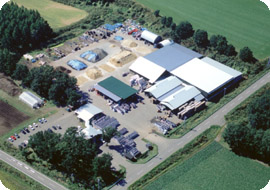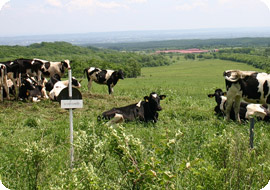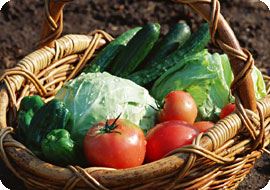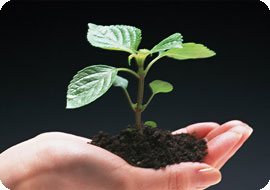
HOME - Company
 Our head office is placed at Shihoro town, countryside in the middle-east aria of Hokkaido, Japan. This town has only 7,000 peoples, and over 30,000 cattle, still increasing. Our company's main business has been production and sale of “Tokachi Bark compost”, for about three decades since we began operation in June 1976.
Our head office is placed at Shihoro town, countryside in the middle-east aria of Hokkaido, Japan. This town has only 7,000 peoples, and over 30,000 cattle, still increasing. Our company's main business has been production and sale of “Tokachi Bark compost”, for about three decades since we began operation in June 1976. We have also been supplying several types of artificial soil for horticulture to major home centers in Hokkaido since April 1985. Tree-planting materials or base material for slope-spraying method, growing medium for agriculture and lawn conditioner are also produced. In response to the steady expansion of our market, we built our second factory in Fukagawa in June 1988. Approximately 53,000m3 of Tokachi Bark were shipped in 2003.
 Bark compost is made from wood wastes, such as sawdust, chip dust and bark, from forest-product plants, and animal excreta from stock farms are added to adjust C/N ratio. 181,000m3 of wood waste produced in Hokkaido, in 1996. Wood wastes were used mainly as fuels in the past. Since its replacement by heavy oil, due to increases in boiler efficiency and shortage of workers, wood waste has recently been used as mostly bedding for animals.
Bark compost is made from wood wastes, such as sawdust, chip dust and bark, from forest-product plants, and animal excreta from stock farms are added to adjust C/N ratio. 181,000m3 of wood waste produced in Hokkaido, in 1996. Wood wastes were used mainly as fuels in the past. Since its replacement by heavy oil, due to increases in boiler efficiency and shortage of workers, wood waste has recently been used as mostly bedding for animals. This use as bedding was expected to increase, given number of the cattle, both dairy and beef, in Hokkaido to 1,306,500 in 1996. With the introduction of the free trade of farm and stock farm products, dairy farming management scale became larger to reduce costs and the numbers of cattle increased.
Consequently, the amounts of animal excreta and bedding have also increased and their disposal has come to be a problem. When there were fewer cattle, farmers disposed of bedding, including straw and sawdust, by making compost individually or sometimes left them as there were. But it is presumed that it will be difficult to increase the number of cattle without proper disposal of animal excreta.
Approximately 369,900(1996) cattle are bred in the Tokachi sub prefecture, where our company is located, and the amount of excreta from these cattle is estimated to be approximately 5.31 million m3. Even incineration is being considered in some areas.
Although only 50,000m3 of excreta are treaded at our company's two factories in Shihoro and Fukagawa, the amount will be able to increase as our market expands.
 Bark compost is mainly sold for agriculture, horticulture, tree planting (a forestation), and lawn maintenance.
In agriculture, our compost is mainly used as a soil conditioner for dry-field farming. This use is expected to increase in the future, because bark compost was approved in 1994 as a soil conditioner under the Soil Fertility Improvement Law.
Bark compost is mainly sold for agriculture, horticulture, tree planting (a forestation), and lawn maintenance.
In agriculture, our compost is mainly used as a soil conditioner for dry-field farming. This use is expected to increase in the future, because bark compost was approved in 1994 as a soil conditioner under the Soil Fertility Improvement Law.And we also provide potting-mix especially for farmers. In general, it is said to be difficult to use cattle-manure-containing compost for nursery pot, because of it’s high-content, not-stable water soluble ingredients, such as potassium or phosphorus. Though we check them each time primary to mix, so we can add other materials, peat-moss, mineral soil, etc. appropriately.
For horticulture, we wholesale compound products containing bark compost, such as soil conditioners to revitalize outdoor gardens, and growing-medium for foliage plants, flowers and indoor potted plants, to the gardening sections of home centers. This field is still growing year by year.
For tree planting, bark compost is used as a base material to recover greenery in the spraying of seeds, on sections where land has been removed or filled for development and public works. Conventional tree-planting methods for development areas mainly involve adding fertile topsoil removed from other areas, it can be described as the destruction of nature for tree planting. The bark compost tree-planting method is becoming popular elsewhere in Japan, also in Hokkaido.
Lawn maintenance in parks and park golf courses is now one of our main work fields. As bark compost rich in microbes and organic matters, which re-organize the root surroundings, decrease the risk of decease, and grow tolerant grass to some changes of environment.
Disposal of animal excreta from stock farms is a serious problem, and it is no exaggeration to say that it is a matter of life and death for the Japanese stock raising industry. By supplying bark compost to the market, produced under strict quality control, demand will naturally increase. We take pride in contributing to forestry and dairy farming in Hokkaido by returning enormous amounts of stock-farming wastes to nature.
 Recently in Japan, not a few people pay good attention to their surroundings, like soil, air, water, or safe foods. So little by little farmers start reducing the amount of agro-chemicals and even fertilizer, public gardens also.
Recently in Japan, not a few people pay good attention to their surroundings, like soil, air, water, or safe foods. So little by little farmers start reducing the amount of agro-chemicals and even fertilizer, public gardens also.
We are sure having an answer for them, that good soil conditioning can revive weakened plants, let us reduce the amount of chemicals and too much fertilizer. We can prepare, sometimes develop items exactly suit for their demand. Our market now, still expanding.
 Recently in Japan, not a few people pay good attention to their surroundings, like soil, air, water, or safe foods. So little by little farmers start reducing the amount of agro-chemicals and even fertilizer, public gardens also.
Recently in Japan, not a few people pay good attention to their surroundings, like soil, air, water, or safe foods. So little by little farmers start reducing the amount of agro-chemicals and even fertilizer, public gardens also. We are sure having an answer for them, that good soil conditioning can revive weakened plants, let us reduce the amount of chemicals and too much fertilizer. We can prepare, sometimes develop items exactly suit for their demand. Our market now, still expanding.
[ TOP ]

